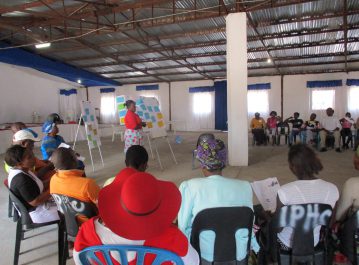Collaborating Institutions: University of Aberdeen, Mpumalanga Province Department of Health, University of the Witwatersrand and Queen Margaret University. PI:Dr Lucia D’Ambruoso
Health systems are the products of human relationships: between patients and health workers, managers and policy makers, communities and governments. As a whole, these establish norms of who is eligible for care and what can be expected from the health system. In settings, where services are weak and under-funded, care that is unaffordable and unavailable can become socially normal. Communities have substantial knowledge about these interactions and norms, and health workers have considerable power over how health policy is ‘brought alive’ through them. The inputs of health workers and communities however are often overlooked in policy and planning. The project aims to strengthen systems to record and report deaths, institutionalise processes to develop the voices of communities on health priorities, and act on this information in partnership with health workers, managers, planners and policy makers. The process will collect data, analyse, plan and act, and demonstrate ability to bring about change. Providing practical research that is easily understood and ‘owned’ by end users in a process that encourages action will strengthen relationships between patients, health workers and policy makers to support and sustain positive change. The research builds on development work improving health information for poor and rural groups in South Africa. To date, the work has been done with the MRC/Wits Rural Public Health and Health Transitions Research Unit in South Africa and with the provincial health authority to consider what the data are telling us, and how changes can be implemented to respond to the issues identified.
CURRENT PROJECTS

CURRENT PROJECTS
Funders: Health Systems Research Initiative from Department for International Development (DFID)/Medical Research Council (MRC)/Wellcome Trust/Economic and Social Research Council (ESRC)

LOREM IPSUM DOLOR SIT COOPNSE
Lorem ipsum dolor sit amet, consectetur adipi
scing elit. Pellentesque massa.
- Feature Point 1 will appear here
- Some Pointer goes here
- Your 100% donation goes to field
- You dont need to worry about the payment
you make
Vestibulum quam nisi, pretium a nibh sit amet, consectetur hendrerit mi. Amet elit porta, et malesuada erat bibendum. Cras sed nunc massa. Tellus malesuada, malesuada iaculis eros dignissim.
LOREM IPSUM DOLOR SIT COOPNSE
Lorem ipsum dolor sit amet, consectetur adipi
scing elit. Pellentesque massa.
- Feature Point 1 will appear here
- Some Pointer goes here
- Your 100% donation goes to field
- You dont need to worry about the payment
you make

LOREM IPSUM DOLOR SIT COOPNSECTETUR ADIPISCING ELIT ELLENTESQUE FUTURE STUFFS ALSO GOES PLACERAT VEL AUGUE
Lorem ipsum dolor sit amet, consectetur adipiscing elit. Pellentesque massa ipsum, efficitur a fermen tum sed, suscipit sit amet arcu. Ut ut finibus tortor, eu ultrices turpis. Mauris vitae elit nec diam elementum elementum. Mauris ante quam, consequat ac nibh placerat, lacinia sollicitudin mi. Duis facilisis nibh quam, sit amet interdum tellus sollicitudin tempor. Curabitur liquam erat in nisl lobortis, ut pellentesque lectus viverra. Aenean sodales aliquet arcu at aliquam.
